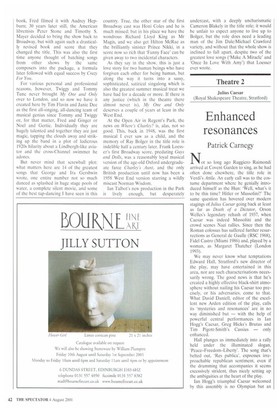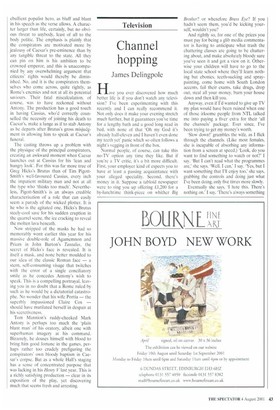Theatre 2
Julius Caesar (Royal Shakespeare Theatre, Stratford)
Enhanced resonances
Patrick Carnegy
Not so long ago Ruggiero Raimondi arrived at Covent Garden to sing, as he had often done elsewhere, the title role in Verdi's Attila. An early call was to the costume department where he genially introduced himself as the Hun: 'Well, what's it to be this time? Hitler or Mussolini?' The same question has hovered over modern stagings of Julius Caesar going back at least as far as Death of a Dictator, Orson Welles's legendary rehash of 1937, when Caesar was indeed Mussolini and the crowd scenes Nazi rallies. Since then the Roman colossus has suffered further resurrections as General de Gaulle (RSC 1968), Fidel Castro (Miami 1986) and, played by a woman, as Margaret Thatcher (London 1993).
We may never know what temptations Edward Hall, Stratford's new director of the play, may have entertained in this area, nor are such characterisations necessarily wrong. The good news is that he's created a highly effective black-shirt atmosphere without nailing his Caesar too precisely, or his adversaries, come to that. What David Daniell, editor of the excellent new Arden edition of the play, calls its 'mysteries and resonances' are in no way diminished but — with the help of powerful central performances in Ian Hogg's Caesar, Greg Hicks's Brutus and
Tim Pigott-Smith's Cassius only enhanced.
Hall plunges us immediately into a rally held under the illuminated slogan, 'Peace–Freedom–Liberty'. The song that's belted out, 'Res publica', expresses irreproachable republican sentiment, even if the drumming that accompanies it seems excessively strident, thus nicely setting up the ambiguities at the heart of the play.
Ian Hogg's triumphal Caesar welcomed by this assembly is no Olympian but an ebullient populist hero, as bluff and blunt in his speech as the verse allows. A character larger than life, certainly, but no obvious threat to anybody, least of all to the body politic. The emphasis is plainly that the conspirators are motivated more by jealousy of Caesar's pre-eminence than by any tangible threat to the state. All they can pin on him is his ambition to be crowned emperor, and this is unaccompanied by any overwhelming argument that citizens' rights would thereby be diminished. No, and it is the conspirators themselves who come across, quite rightly, as Rome's enemies and not at all its potential saviours. Their fatal miscalculation, of course, was to have reckoned without Antony. The production has a good touch in having Cassius, who'd correctly counselled the necessity of joining his death to Caesar's, make a lunge as if to stab Antony as he departs after Brutus's gross misjudgment in allowing him to speak at Caesar's funeral.
The casting throws up a problem with the physique of the principal conspirators, creating an awkward moment when Caesar launches out at Cassius for his 'lean and hungry look'. For this was far more true of Greg Hicks's Brutus than of Tim PigottSmith's well-favoured Cassius, every inch the impatient military man and not at all the type who 'thinks too much'. Nevertheless, Pigott-Smith's is an always credible characterisation of a role that can easily seem a parody of the wicked plotter. It is he who is the agitated one, Hicks's Brutus steely-cool save for his sudden eruption in the quarrel scene, the ice cracking to reveal the molten lava beneath.
Now stripped of the masks he had so memorably worn earlier this year for his massive double-role of Agamemnon and Priam in John Barton's Tantalus, the secret of Hicks's face is revealed, It is itself a mask, and none better moulded to our idea of the classic Roman face — a stern, self-consuming visage that twitches with the error of a single conciliatory smile as he concedes Antony's wish to speak. This is a compelling portrayal, leaving you in no doubt that a Rome ruled by such as he would be a dictatorial catastrophe. No wonder that his wife Portia — the superbly impassioned Claire Cox — should have mutilated herself in despair at his secretiveness.
Tom Mannion's ruddy-checked Mark Antony is perhaps too much the 'plain blunt man' of his oratory, albeit one with superhuman imagery at his command. Bizarrely, he douses himself with blood to bring him good fortune in the games, perhaps rather too crudely prefiguring the conspirators' own bloody baptism in Caesar's corpse. But as a whole Hall's staging has a sense of concentrated purpose that was lacking in his Hemy V last year. This is a richly satisfying production — clear in its exposition of the play, yet discovering much that seems fresh and arresting.



























































 Previous page
Previous page